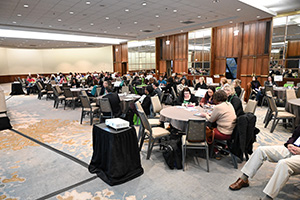
by Rhonda Kitch, University Registrar, Cornell University
Attendees gathered to share struggles and best practices navigating “The Great Resignation,” a term coined in May 2021 by Anthony Klotz, a psychologist and professor of business administration at Texas A&M University, who is now at University College London.
Dr. Kevin Pollock, President of Central Carolina Technical College, shared insights on the shifts from two-year to four-year institutions, as well as public and private institutions, but also the shared experiences. While service industries have struggled significantly, mid-career professionals and healthcare workers have also left en masse. Reasons vary for resignations, but reevaluating priorities, the ability to work from home, pandemic fears, relocation opportunities, reshuffling, and restructuring top workers’ lists.
The impact within higher education is evident, as 80% of student affairs colleagues experienced burnout and were frustrated by low salaries. In addition, declining enrollments resulted in substantial budget impacts and an inability to provide raises to retain existing staff at many institutions. Colleges and universities have reported faculty departing at higher rates than previous timeframes and are finding it increasingly difficult to retain individuals in institutional research, IT, and grant writing roles, as individuals may capture higher-paying roles outside the education industry.
Dr. Pollock shared that at Central Carolina Technical College, employees have left due to many reasons, including compensation, flexibility, personal reasons, promotional opportunities, returning to school, working conditions, fellow employees, and retirement. As part of efforts to recruit and retain staff, bonuses and raises have aided in closing the compensation gaps, but efforts continue to try to minimize resignations. A faculty task force has been working to rethink the class schedule and is developing a student-focused class schedule that focuses on class demand and reducing student conflicts by staggering the schedule to support student enrollment. The data-driven approach will also right-size faculty workload, which will hopefully support faculty retention.
Attendees discussed navigating “the great regret” as employees who left as part of the great resignation are now seeking to return to the institution, and in some instances seeking to negotiate a return. Participants shared strategies for navigating through campus vacancies and staffing morale challenges, including:
Flexible work schedules, developed with equity and fairness
Commitment to a culture of belonging, ensuring employees feel involved and valued
Investment in professional development
Creating pathways for job mobility
Summer appreciation time– six half-days off throughout the summer
Flex times on Fridays
Casual Fridays
Semester kick-off events
Recognize the issues that impact women, single parents, and parents of young children and create support systems and flexibility for employees
Continuing the dialogue on our respective campuses is critical, yet campus culture and priorities vary. Focusing on key relationships and access points is essential in conveying priorities to campus leadership, as is relying on data to tell the story and making the case for a more inclusive and relevant future. Some institutions are navigating the reality of right-sizing at their institution, as enrollment declines continue yet an institution has the opportunity to re-think the service delivery goals of the institution.
Attendees engaged in thoughtful dialogue surrounding the complexities of the “Great Resignation” during the roundtable session. There was recognition of the many struggles and the lack of a single, perfect solution, yet the key takeaway was that it is imperative that individuals need to engage in critical conversations to support employees in creating a culture of support and belonging at their respective institutions.